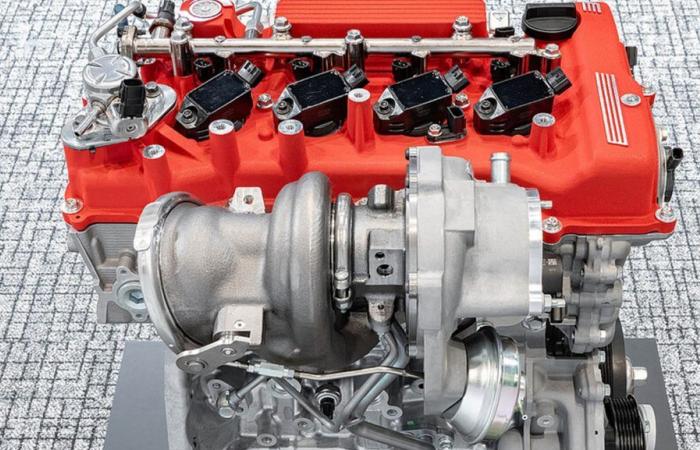
06/14/2024 18:27
Updated 06/14/2024 18:27
In addition to the complete transformation of Lexus into a 100% electric brand, in Toyota’s backroom there are 30 different projects that should be completed before the end of the decade. Although its first products did not receive the expected reception, the Japanese mentality does not consider the possibility of giving up. Koji Satoits president, explained a few weeks ago the pillars on which Toyota will rely to maintain its leadership in the market.
Three years ago, Toyota began testing an unconventional and powerful engine technology, seeking a carbon-neutral alternative to electric vehicles. The concept consisted of an engine that used hydrogen as fuel and practically does not emit carbon dioxideeither. The then executive director, Akio Toyodapersonally led this initiative, testing the setup on a GR Corolla racing car.
A complicated technology with many challenges to overcome
He hydrogen It burns faster and at a higher temperature than gasoline. Achieving the perfect balance between power and efficiency is almost as much science as art. Precise control of engine heat and fuel injection is meticulous and complex, but absolutely essential.
Three years of work later, at present, Toyota Motor has advanced quite successfully in the goal of mastering hydrogen combustion. The result is much more than an ultra-fast and powerful Corolla. Lessons learned have also generated advances that are enabling the next generation of low-carbon Toyota engines. is suitable for use on the street.
On May 28, the world’s largest automaker presented its strategy for these smaller, more efficient engines at a press conference in Tokyo. The technology director, Hiroki Nakajima, explained that Toyota’s experience in developing the hydrogen racing vehicle will directly influence these future production engines. And yes, eventually feed them with hydrogen It is part of Toyota’s long-term plan.
Smaller engines, just as powerful and more efficient
Among the new Toyota engines is a 1.5 litersavailable in both naturally aspirated and turbocharged versions, as well as a turbocharged unit of 2.0 liters.
Both are 10% to 20% smaller than the current ones, but they offer the same or even better efficiency figures and greater power. But the most relevant thing is that they can work with various carbon neutral fuels: synthetics, biodiesel or hydrogen, in addition to gasoline. Their compact size and low emissions make them ideal for electrified hybrid systems.
Toyota has been sparing in revealing specifications, but Nakajima was very confident that they will represent a big leap forward. “This could be a revolutionary solution,” he said, because the new engines have a lot of power. room for improvement in the next stages of development.
The two engineering ‘tricks’ to operate in a hybrid system
Because the new motors are designed to work in conjunction with electric motors in a hybrid system, the engineers could afford to limit the engine torque so that the electric one compensates for it. Through the creation of a shorter piston strokethey managed to reduce the overall power by moderating the speed, that is, the revolutions per minute.
Traditionally, longer strokes have been considered more appropriate as they allow more air and fuel to be drawn in. Nakajima explained that reducing this length was a major challenge. The result was a reduction in maximum revolutions per minute, which improved efficiency. An additional advantage of the shorter stroke is the more compact dimensions of the engine, meaning that designers can reduce the height of the bonnet which in turn results in a more aerodynamic body design.
Years of experimentation with hydrogen combustion in racing has allowed Toyota a deeper understanding of the nuances of motor thermal efficiencyNakajima noted. It is a measure of how much engine energy is converted into useful energy for turning the wheels rather than being lost as heat during combustion.
Today’s most efficient motors achieve thermal efficiency rates greater than 40%. However, engines tuned to generate electricity in hybrid configurations can reach up to 50%, as is the case in some configurations with Nissan’s e-Power engine.
Toyota has not revealed exact thermal efficiency figures for the new engines. However, it claims that the new 1.5-litre naturally aspirated engine will outperform its petrol equivalent. The same will happen with the 2.0-liter turbo engine compared to the current 2.4-liter.
“The development of hydrogen engines has really contributed to our deeper understanding of engine thermal efficiency,” Nakajima said: “It was a catalyst for this technology.”
A reality in street cars
Toyota hopes these engines will hit the market in time to meet strict emissions standards Euro 7 that will come into force in 2027 so the brand is likely to release its detailed specifications by then. In the long term, the engines are designed to run on carbon neutral fuels, which will make future hybrids virtually emissions-free. “The engines will be completely different from today’s conventional engines,” Nakajima noted.
Meanwhile, Toyota continues working on hydrogen combustion. In a 24-hour endurance race at Fuji Speedway in late May, the new prototype debuted a more reliable liquid hydrogen bomb, after the version used in a previous race had to be replaced twice during the race. Another improvement was a larger hydrogen tank that increased cruising range by 50%.
Despite facing other problems such as the anti-lock braking system or the sudden drop in fuel pressure, which led to the Corolla being stuck in the pits for 9 of the total 24 hours of the race, Toyota reaffirmed its commitment to long-term internal combustion.





